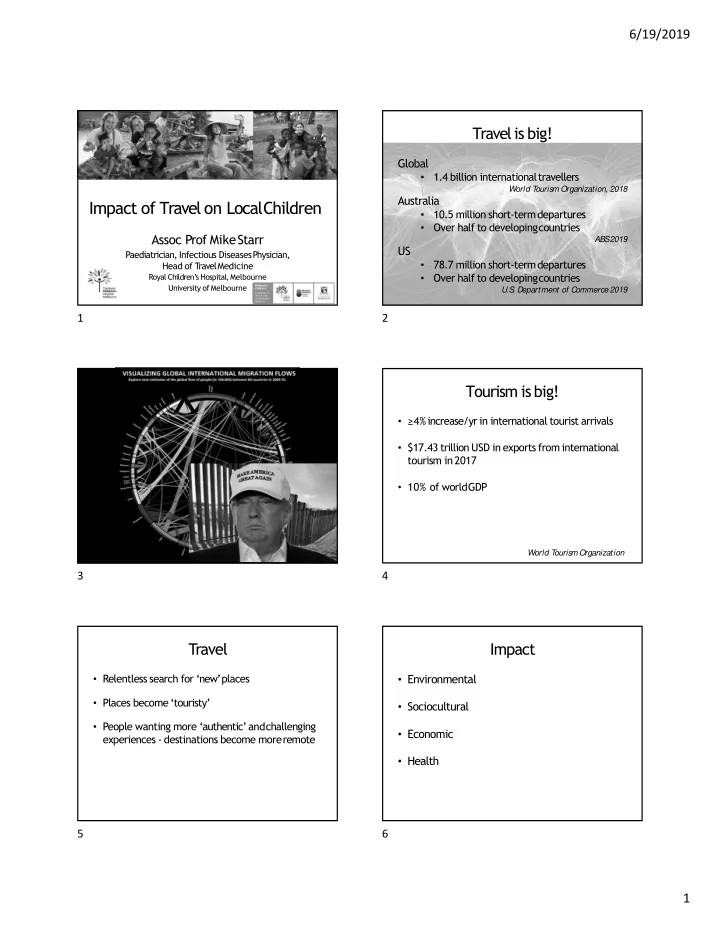

6/19/2019 Travel is big! Global 1.4 billion internationaltravellers • World T ourism Organization, 2018 Australia Impact of Travel on LocalChildren 10.5 million short-termdepartures • Over half to developingcountries • Assoc Prof MikeStarr ABS2019 US Paediatrician, Infectious DiseasesPhysician, 78.7 million short-termdepartures Head of T ravelMedicine • Over half to developingcountries Royal Children’s Hospital,Melbourne • University of Melbourne U.S . Department of Commerce 2019 1 2 X Tourism is big! • ≥ 4%increase/yr in international tourist arrivals • $17.43 trillion USD in exports from international tourism in2017 • 10% of worldGDP World T ourism Organization Abel G & S ander. S cience. 2014;343:1520-2 3 4 Travel Impact • Relentless search for ‘new’places • Environmental • Places become‘touristy’ • Sociocultural • People wanting more ‘authentic’ andchallenging • Economic experiences - destinations become moreremote • Health 5 6 1
6/19/2019 Environmental impacts -pos Ecotourism • Development ofinfrastructure • Coined in 80s byHéctor Ceballas-Lascuráin • Allows a person to ‘study ,admire and enjoy’scenery , • Increased awareness ofpro-environmental plants, animals, cultures in undisturbedplaces behaviour • Hope that tourist will eventually ‘acquire a • Conservation of wildlife and natural resources - consciousness and knowledge of the natural regarded as tourismassets environment together with its cultural aspects,that will convert him into somebody keenly involved in conservation issues’ 7 8 Ecotourism • Should be linkedto sustainability: – meeting theneeds of the present without compromising the ability of future generations to meet their own needs 9 10 Environmental impacts -neg • Overdevelopment • Overconsumption • Damage to formerly pristineregions • Land acquisitions in name of tourism – resettlement oflocals • Increased air traffic, petrochemicals,sewage • Pollution 11 12 2
6/19/2019 Sociocultural impacts Sociocultural impacts -pos • “..when there is large contrast between the • Positive attitudes and learning abouteach other’s culture andcustoms culture of the receiving society and the origin culture, then it is likely that impacts will be • Preservation of traditional customs,handicrafts greatest.” and festivals • T olerance • Helps raise global awareness of issues such as poverty and human rightsabuses Burns& Holden. In: T ourism: ANew P erspective. P rentice Hall, 1995 13 14 Sociocultural impacts -pos • Promotes social development through employment creation, income redistributionand poverty alleviation • Strengthens communities • Facilities developed for tourism canbenefit residents 15 16 Sociocultural impacts -neg Economic impacts • Crowding andcongestion • T ourism employs >100 million peopleworldwide – up to 265 million people directly and indirectly • Drugs and alcoholproblems – many are migrants andwomen • Prostitution and increasedcrime – 50% are ≤ 25 yo • Erosion of traditional cultures andvalues International Labour Organisation 17 18 3
6/19/2019 Economic impacts -pos • Creation ofemployment • Better welfare, hygiene, health,etc 19 20 Economic impacts -neg Economic impacts -neg • Benefits may leak back to foreign countries (travel • Children often required to supplementfamily agents, hotel chains,etc) income • 13-19 million children working in an occupation • Increase in local property prices and the cost of tied to tourism e.g. selling goods on beaches, goods andservices carrying luggage • Average wages rarely constitute livingwage • Women often have lowest paid, lowest status jobs • Inadequate provision for theirchildren International Labour Organisation International Labour Organisation Global S lavery Index 21 22 Economic impacts -neg • Modern slavery – >45 million people globally - >5 million children – Sweatshops – Domestic work – Prostitution International Labour Organisation Global S lavery Index 23 24 4
6/19/2019 • Highest prevalence - Nth Korea, Uzbekistan, Cambodia, India, Qatar • Highest absolute numbers - India,China, Pakistan, Bangladesh, Uzbekistan 25 26 Health impacts -pos Health impacts -neg • Improved health andhygiene • Pressure on local healthcare facilities • Improved nutrition • Increased wait times, increasedcosts • Expansion of medicalfacilities • Lack of attention to the health needs of the local population • Increased training opportunities for healthcare workers • Obesity • Retention ofHCWs • Mental healthissues 27 28 Voluntourism • Growing trend of tourism activitiesfeaturing visits to local schools and orphanages, or businesses arranging short-term volunteer opportunities • Volunteers are generally well-intentioned – don’t realise they may inadvertently becausing harm tochildren 29 30 5
6/19/2019 Voluntourism Example -Phuket • In some cases, children deliberately separated • T ourismhas become the region's biggest industry from their families and placed in orphanages so • > 3 million visitors everyyear they can be used to attract fee-paying • Influx of thousands of Thais looking for jobs volunteers anddonors • Prices pushed up - on par ,if not higher than Bangkok • Many Thais living in camps and working long hours • Many children abandoned – cared for in orphanages • Funding for orphanages hasdwindled 31 32 Orphanage tourism • Globally , up to 8 million childrenlive in institutions >80% of these childrenhave parents or family • Risk of children becomingtourist attractions • T ourists become agents for orphanages as business enterprises rather than as sites of care 33 34 35 36 6
6/19/2019 10 principles 1. Mutual understanding and respectbetween peoples andsocieties 2. Individual and collectivefulfillment 3. Sustainable development 4. Enhancement of culturalheritage 5. Beneficial activity for host countriesand communities http:/ / ethics.unwto.org/ en/ content/ global-code-ethics-tourism 37 38 10 principles 6. Obligations ofstakeholders 7. Right totourism 8. Liberty of touristmovements 9. Rights of the workers and entrepreneurs in the tourism industry 10.Implementation of the principles of the Global Code of Ethics forT ourism 39 40 5 keyareas 1. Inclusive and sustainable economicgrowth 2. Social inclusiveness, employment andpoverty reduction 3. Resource efficiency , environmentalprotection and climatechange 4. Cultural values, diversity andheritage 5. Mutual understanding, peace andsecurity 41 42 7
6/19/2019 Conclusion • T ourism has the potential to improve the lives of millions ofchildren • Need to ensure the sustainability of the destination, not just thevisit 43 44 8
Recommend
More recommend